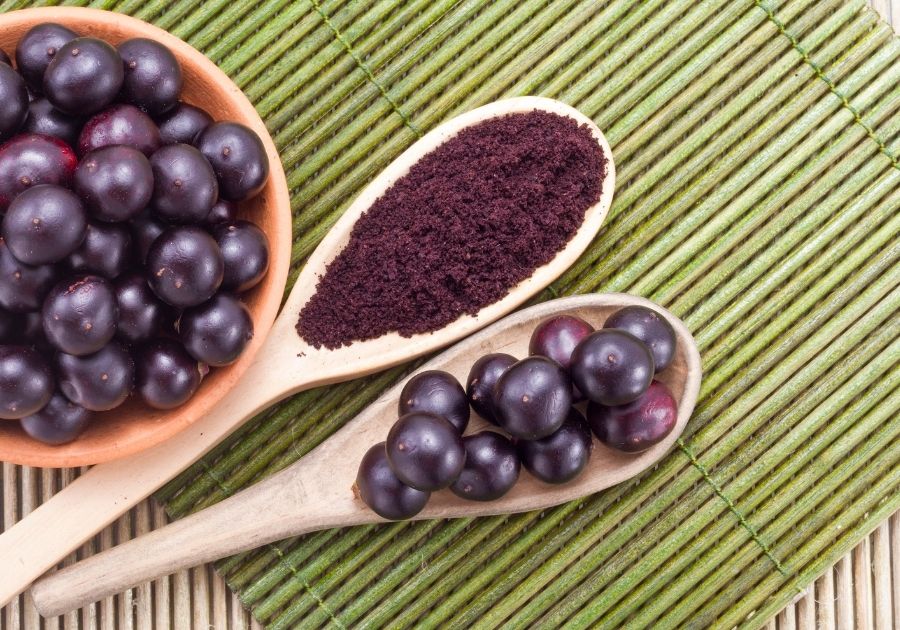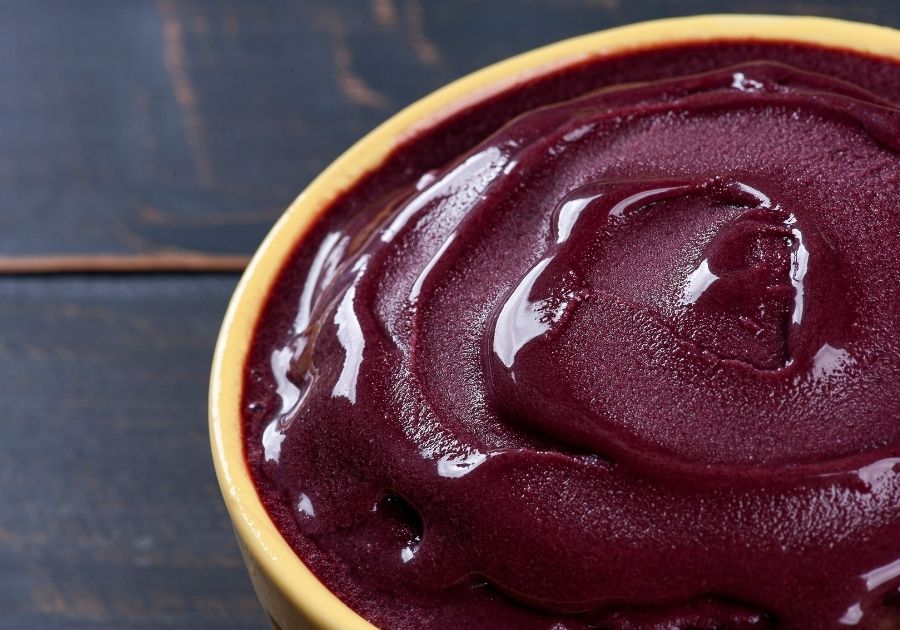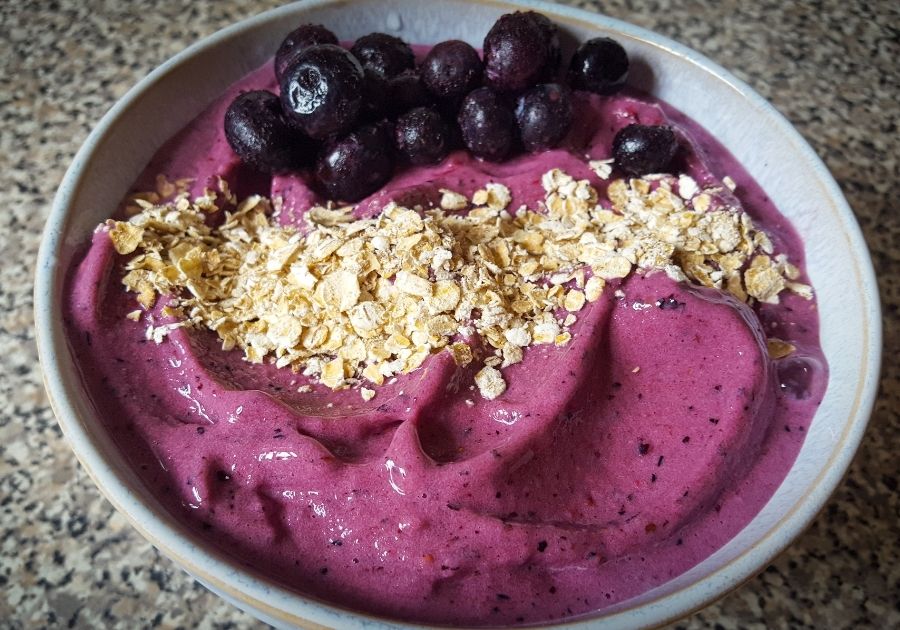Fruits can be of great nutritional benefit to dogs. They can help strengthen a dog’s immune system, improve the digestion process, and more.
Berries, in particular, are known to have health-bearing properties considering they offer plenty of nutritional benefits in just a bite-size package.
However, not all fruits or berries may be safe for dogs to eat, as a few berries are associated with a lot of health risks.
What about acai? Can dogs eat acai berries? This article examines answers to these questions and more. Read on!
What is Acai Berries?

Acai, scientifically named Euterpe Oleacera, is a palm tree that is grown for its grape-like berry fruit, trunk wood, and palm leaves.
They are a native tree species to Brazil’s Amazon. Acai berry fruits are small, round, and a dark-purple color with quite a tangy-earthy taste.
Today, this berry is an exemplary staple food that is in high global demand and widely known for its rich health benefits to humans.
However, dealing with the subject of this article, the real question lies in its safety and health benefit to dogs.
Can Dogs Eat Acai?
There is no straightforward answer to the above question. No doubt, acai offers several health benefits to humans, but to dogs, it is complicated.
It contains several nutrients that are beneficial to a dog’s health.
Nonetheless, it also contains a very toxic compound called “theobromine,” which is poisonous to dogs, the very same compound that also renders chocolate poisonous to dogs.
A report by the National Animal Supplement Council (NASC) regarding dog consumption of acai advises dog parents to keep off the fruits.
Yet, several dog parents claim to have fed a minimal quantity of this fruit to their dogs without any resulting adverse effects or theobromine toxicity.
It is within logic to agree that a minimal quantity of acai consumption in dogs and on an occasional basis will not cause any ill health to dogs.
However, it would also be safer to err on the side of caution and completely avoid feeding acai to dogs.
Keeping both opinions in mind, this article would consider both the good and bad, the potential benefit versus the risk of feeding acai to your dog.

Below is a nutrient profile of 100g of acai berries.
| Nutrition Facts | Amount |
|---|---|
| Calories | 75 |
| Fat | 6.5g |
| Sodium | 5mg |
| Potassium | 235mg |
| Carbohydrate | 5.4g |
| Fiber | 3.8g |
| Sugars | 1.1g |
| Protein | 1.1g |
| Vitamin A | 2% |
| Vitamin C | 13% |
| Calcium | 0.9% |
| Iron | 2% |
It is evident from the nutrition facts above that acai certainly does contain nutrients and minerals that can benefit a dog’s health.
The following section considers the several ways these berries can be of benefit to dogs.
Health Benefits: Is Acai Good For Dogs
Rich in Antioxidants
Acai berries are a rich source of antioxidants, i.e., Substances such as vitamin C that inhibit potentially harmful oxidizing agents in dogs and help strengthen dogs’ immune systems.
Heart Health
It is common knowledge that fish is a major source of omega-3 fatty acids, which benefit dogs in a number of ways, including improving cognitive functions.
However, acai berry is also another source of omega-3 fatty acids. Hence feeding a small amount of acai fruit to your dog will reduce its risk of cardiovascular diseases.
Provides Calcium
calcium is another mineral a dog needs. According to experts on dog nutrition, a dog needs 1g of calcium daily.
This mineral aids in the formation of teeth and bones, smooth function of muscle contraction, nerve impulse transmission, and cell signaling.
Calcium also helps with blood clotting, which is an important aspect in the healing of wounds, and acai contains a reasonable amount of calcium.
Anthocyanins
as with other berries, anthocyanins are present in acai berries. These water-soluble vacuolar pigments are responsible for the darker color in most berry fruit.
However, its benefits transcend beyond color pigmentation as it possesses potent anti-inflammatory properties and is thus helpful in fighting the effects of chronic inflammation.
It also can neutralize superoxides, which a dog is likely to produce whenever under stress.
May Reduce the Risk of Cancer
Although there isn’t any scientific research to back this claim except preliminary animal studies, there is the possibility of acai being helpful in fighting off colon cancer.
A particular study carried out on mice infected with colon cancer showed that the effects of pellets with 5% of acai powder resulted in a 76.9% reduction in both cancerous and non-cancerous tumors in the mice.
Why You Should Not Give Acai To Your Dog
As much as there are health benefits of acai consumption in dogs, there are also dangers to be aware of.
Explained below are some health dangers associated with dog consumption of this berries.
Theobromine
As noted earlier, Acai contains theobromine, a toxic substance that also makes chocolate an absolutely unsafe treat for dogs.
But what exactly is theobromine?
Theobromine, mostly known for being one of the several compounds that are naturally present in chocolate, is a molecule made in plants, especially in cocoa, considering it is a major alkaloidal constituent of the cocoa tree.
In humans, theobromine gives that “wake-up and active” feeling associated with caffeine.
However, in dogs, it is a highly toxic substance in large quantities, meaning a dog would have to consume a lot of it to suffer its ill effects.
Dogs cannot fully metabolize theobromine leaving it stuck in the liver for around 18 hours before getting it out of the body.
18 hours is more than enough for this substance to cause damage to a dog’s system.
Some symptoms of theobromine poisoning in dogs include:
- Increased heartbeat
- Irritability
- Vomiting
- Abnormal thirst
- Abnormal panting
- Loss of body movement or control
- Seizures (in extreme cases)
- Irregular heartbeat (in extreme cases)
Symptoms of theobromine poisoning may appear at least 2 hours from consumption and up to 24 hours after consumption.
However, a dog must have eaten a considerable amount of acai to suffer theobromine poisoning.
Lethal doses of theobromine consumption in dogs fall between 100mg to 500mg per kg of a dog’s body weight.
Dive Deeper:
What Toxins Can Cause Seizures In Dogs? Careful!
Possible Allergy Development
Food allergy is common among dogs. Some dogs are sensitive to certain food and will show signs of an allergic reaction after eating them.
So if feeding acai to a dog that is sensitive to berries in general or high protein fruits, this may trigger an allergic reaction. This is nothing life-threatening as theobromine poisoning.
If you notice your dog doesn’t react well to acai, all you need to do is to quit feeding this berry to your dog or mix a very small amount with other healthy foods.
Instability
A study shows that the antioxidants present in acai are not stable, meaning if you do not preserve acai berry well. It will lose its antioxidant properties.
For this reason, it would be best to feed only fresh or frozen acai berry to dogs.
How To Safely Feed Acai To Dogs
Having considered the benefits and potential dangers of acai on a dog’s health, If you’re still intent on feeding acai to your dog, the following information will be helpful to feed your dog safely.
The seed of the acai berry makes up a significant part of the fruit. Fruit seeds are harmful to dogs; therefore, you have to remove the seed before serving it to your dog.
As stated earlier, feed only fresh or frozen acai to your dog in moderation and infrequently. You can also feed acai powder to your dog but also in very minimal quantity.
There is not much that goes into the preparation of acai for your dog other than properly washing and feeding only fresh or raw acai to dogs.
Note acai should not substitute as a treat or main diet due to the possibility of theobromine poisoning.
How Many Acai Berries Should I Feed My Dog?
It has been established that the major threat that lies in a dog’s consumption of acai is theobromine poisoning.
In minimal quantity, theobromine wouldn’t cause any harm to dogs; however, in large quantity can be fatal.
Hence the need to feed a moderate quantity of acai to dogs to avoid theobromine poisoning. This leads to the question, how many acai berries is a safe number to feed your dog?
Acai is a small fruit that measures between 1-2 cm in diameter, with the seed making up a significant part of the fruit.
The pulp of the fruit that is edible to dogs is very small; therefore, feeding five skin or pulp of acai berry occasionally should be enough.
However, it would be advisable to consult with a vet for a thorough acai diet plan that doesn’t expose your dog to any health risks.
Can Dogs Eat Acai Bowls?

Acai bowls are acai berries mixed with several toppings such as strawberries and bananas.
The same risk associated with a dog’s consumption of acai berries also applies to acai bowls. So, you can safely feed only a very small amount of acai bowls to your dog.
Can Dogs Have Acai Sorbet?
Acai sorbet is a combination of two toxic substances: theobromine and a high level of sugar and artificial sweeteners.
A high amount of sugar can result in serious health issues in dogs, including diabetes and high blood sugar. Therefore, acai sorbet is totally unsafe for dog consumption.
Are Dogs Allergic To Acai?
Dogs can be allergic to any unfamiliar food. It doesn’t matter if such food is healthy for their consumption.
Hence, the need to be cautious when feeding new food to your dog, especially for the first time.
However, most dogs aren’t allergic to acai; still, it is possible for some to be allergic.
What To Do If My Dog Ate Acai
Accidents do happen, and dogs often get into trouble by eating things that endanger their health.
If your dog happens to eat a large quantity of acai, what should you do?
In this unfortunate event, take note of the amount of acai your dog must have eaten and take such dog to the vet immediately, holding the parcel of acai or the fruit to give to your vet as a sample.
Depending on the amount of theobromine in your dog’s system, your vet will likely recommend something that will aid the flushing of theobromine out from its system.
Alternatives To Acai Berries You Can Feed Your Dog
Some dog parents may decide to ultimately strike off acai from their dog food menu and avoid the risk of dealing with potential theobromine poisoning.
Below are other healthy alternatives to acai to consider for your dog.
Blackberries
Blackberry fruits are also an excellent source of antioxidants like acai but exclude the risk of theobromine poisoning and contain a significant amount of minerals and vitamins.
Blueberries
Blueberries can serve as a low-calorie treat for dogs as they contain a low amount of calories and a moderate amount of nutrients that support the overall good health of dogs.
Cranberries
Cranberry is another healthy alternative to acai. Cranberries help in the prevention of cancer, fight bacteria, and even improve the health of a dog’s bladder.
Recommended:
Can Dogs Eat Mulberries? Are They Toxic?
FAQs
Is acai poisonous to dogs?
When eaten moderately, acai berries aren’t poisonous to dogs.
What other fruits are safe for dogs to eat?
There are whole lots of fruits that are both safe and unsafe for dogs to eat.
However, apples, bananas, and mangoes are some of the safe fruit you can indulge your dog in.
Are all berries unsafe for dogs to eat?
No. Strawberries, blueberries, and blackberries are all safe for dogs to eat in moderation.
Wrap Up
The real question isn’t “can dogs have acai?” because dogs will obviously eat anything that smells good and tastes good, but the question should be, “are acai berries toxic to dogs?”
After considering the befits and dangers of acai consumption in dogs, it is safe to conclude that acai berries aren’t toxic to dogs as long as they’re not eaten in large amounts.
To dog parents that may still feel skeptical about feeding acai to dogs which is understandable, it would be best to avoid feeding your pet dog acai completely.
Still, the underlying fact regarding a dog’s consumption of acai depends on how you, as a dog parent, view the potential benefits of the fruit in comparison to the risk to your dog.
Hopefully, this article has done its bit in providing the necessary information to aid your decision.
You May Also Like:
Can Dogs Eat Black Olives? Are They Bad For Dogs?







